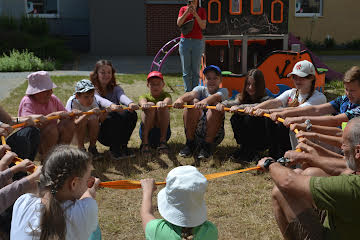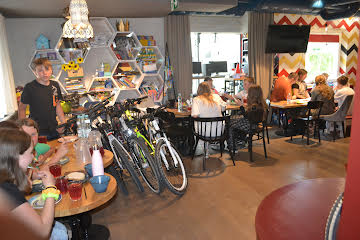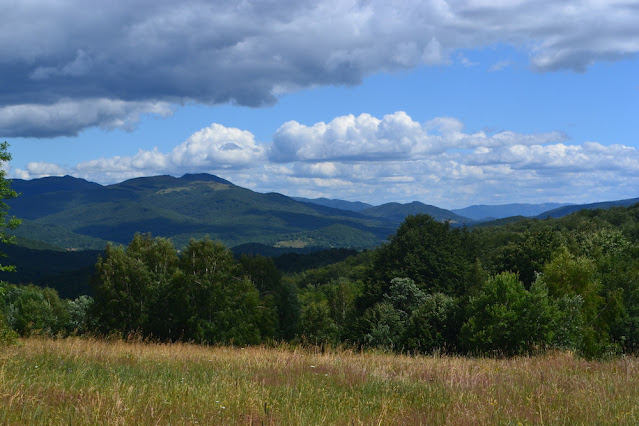BADA BOOM Summer Adventure Program!
On Monday morning, 18 Ukrainian children ages 8 – 16 gathered at Bada Boom. Our program has 9 students, ages 11-16: Anastasia, Pavlo, Sonia, Zlata, Milana, Dima, Katia, Polina and Liza. Each morning we include the younger children attending Bada Boom’s camp in an hour of games, initiatives (Misha and I had to refresh on some old skills, but they came back easily and are super fun!) and songs (all in English). After that, before heading out on our adventure, we were all seated at the table for a “2nd breakfast”. First thing these children initiated was a toast (with their glasses of cherry compote) ‘To Putin’s death”!
Shipwrecked!
At 10AM, our group headed off to the center of town to get our bike rentals. To our surprise (or not!), instead of the expected fleet of mountain bikes, we received half mountain bikes and half thin tired town bikes, two of of which were old clunkers; retired 100lb, first generation City-type bikes. Amazingly enough, none of the children complained. They got on the bikeś they were given and rode. With 5 bike locks and 4 helmets, we were on our way! It was raining steadily and between the slippery clay and an inadequate bike fleet, our plans had to shift. Only three students had rain coats. The good news; all the kids knew how to ride! We found a giant willow tree to hide and play games under during the heaviest of rain. When we returned from the day, we cleaned our muddy bikes. Misha and I were very impressed with the enthusiasm and time the children put into this.
At the end of the day, all bikes are stored inside Bada Boom
We were back by 16:00, in time for dinner. Galina, the cook (and mother of Pavlo) serves the most amazing 3 meals a day; all traditional Ukrainian food (borsht, varenniki, sirniki, pirogi), of course, with minimal supplies available to her, all prepared in a small kitchen with 2 burners. The food is familiar to us as it is similiar to the food Misha’s mom feeds us, including the expectation to eat (a lot!). In the evenings, we ran around town in heavy downpours searching for rain gear, bike helmets, more adequate bikes and supplies for games and initiatives. And so went our first week of camp. We have truly gotten to know the local trails, found an amazing pizza place in a village right off the trail, kayaked up the Wislok River to a lovely picnic spot, played volleyball, walked underneath the city of Rzeszow on an Underground History Tour, fixed broken chains and flats, ate ice cream, lots of cherries (in season and literally falling off the trees everywhere) and visited a “Bedtime Cartoons Museum” dedicated to Winnie the Pooh and such. In addition to the expected linguistically difficulties (we speak in English, then Misha translates into Russian, then one of the older children translates into Ukrainian).
Look at that technique!
We have encountered a few noteworthy teaching challenges, one being cell phones. Parents insist the children must carry their phones at all times, and considering their trauma, we have to respect this. It took most of the week to establish and enforce a “no phone” culture. Yet our biggest challenge has been to establish norms of mutual respect and cooperation. On day two, a conflict broke out when we paired 2 particular students together for kayaking. When we sat down to process it and discuss how one’s feelings can be hurt by another’s words, it turned out they had no interest in getting along and the expectation of learning to like and accept everyone in the group and resolve conflicts through compassionate group process was an idea from Mars! In truth, these kids have had two years of COVID, much like kids at home, and on the tail end of it, their home country was attacked and the war has caused them to flee their homes (many leaving family members at home and fathers fighting). For the past four months, they have been living in isolation or amongst many strangers, in a foreign country, while loved, sometimes to their detriment, by their moms, life must be confusing and hard.
In the end, the more cooperative and mature students carried the day. And, in truth, they are all amazing kids in their own right. It is great for us to work together after so many years! It is like when we started Kroka!
After returning the last bicycles at 20:00, we downloaded the app (a big accomplishment for us) with 2% charge left on the phone and rented an electric scooter and rode double through the rain the 2 kilometers to our home. Very fun!
With the first week complete, we are exhausted and happy to be doing what we know the best and to be of use. And. . . we have seen some positive change in the children!
Now, we have 3 days to scout the Bieszczady Mountains, gather food and gear and rent a van for next week’s expedition!
A few notes about Poland: Half of their city busses are fully electric and locally made!
They follow rules in the most unimaginable ways: there is absolutely no j-walking and bicyclists are given utmost respect by motorists (and there are many of both!). Rzeszow, the only part of Poland we know thus far, is super safe. There is almost no police presence (and they don’t seem to carry guns), no noticeable homelessness and you can leave your bikes and cars unlocked. At the same time, we have not seen a single openly gay person and it is shockingly white with a Catholic or Eastern Orthodox church on every corner. All Jews, from Rzeszow, perished in the Holocaust. There are memorials and some mention in museums, with all fingers pointed at Germans. Jews, once comprising the second largest ethnicity in Poland, have not returned (less than 5,000 country wide). One cultural difference we have experienced and observed is that Polish people don’t make eye contact or acknowledge strangers, even when biking or walking by. Yet, if you ask for assistance, people are friendly and helpful.
On Thursday evening, we accompanied Dr. Yossi Ives and his wife Rifke, who flew in from London to visit Topaz’s refugee shelters. Misha did an amazing job, unexpectedly, as the translator. Dr Ives is a philanthropist who sponsors Topaz’s efforts in Ukraine and Poland.
In each shelter, we met with women and children and heard their stories, concerns and hopes. It was eye-opening and heart-breaking. Young families with their lives and hopes shattered and suspended, only wishing to return home (while many of those homes are destroyed). There is no timeline, no certainty and only temporary security. It is unfathomable how could anyone choose a path of war.
Praying for peace,
Lynne and Misha














Comments
Post a Comment